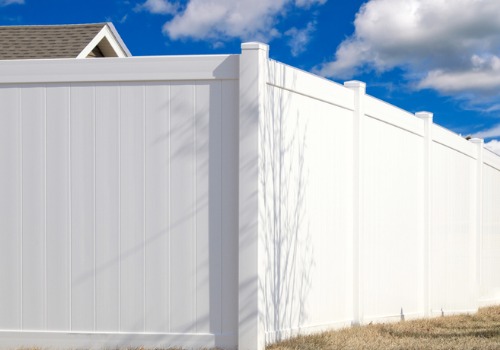- Peoria, IL:309-965-2241


02/09/2023
The seasonal temperature changes we experience in Central Illinois can make it hard to figure out what fence material works best for your climate. Summer heat and ultra-violet sun rays can warp and wear out some residential fencing prematurely. Meanwhile, cold winter temperatures cause cracks, loosen fence posts, and expose fencing to heavy snow that can bring down fences. Plus, wet and windy conditions can create moisture damage or blow over fencing.
The fencing experts at Hohulin Fence highly recommend vinyl fencing when you are looking for a solution that holds up to extreme weather. Contact us any time you have questions about the right fencing options for your property. Since 1897, we have provided trusted fence installation services for customers throughout Bloomington, Normal, Peoria, East Peoria, Morton, Pekin, Washington, and all of Central Illinois. Continue reading to learn more about why our top-rated fence company recommends vinyl fencing for its weather resistance.
Several of our customers are shocked to learn that wood fences are not the best solution when it comes to the fence material that works best for your climate. Intense summer heat often causes wood fences to lean to one side, buckle, or warp. The heat causes wood to expand, leading to damage when it contracts as temperatures cool. In addition, boards separate from fasteners during the expansion-contraction cycle, damaging structural integrity.
Unlike wood, vinyl fencing offers much greater resistance to damage from expansion and contraction. Vinyl materials do not expand nearly as much as wood during those scorching summer days. That is because vinyl does not conduct heat well. So, vinyl fences will not burn your hands like other fence materials when you touch them during hot conditions. Therefore, vinyl fences offer less risk of injury to children or pets that touch fencing surfaces.
You also need to consider the frigid temperatures during the winter when determining what fence materials works best for your climate. These cold temperatures will cause any moisture on your fencing to freeze. For an absorbent material like wood, the freezing and thawing of moisture will break apart fence components. That is not a concern with vinyl fences. Since water does not get absorbed by the vinyl materials, it will not crack or destroy the components like wood fencing.
In addition, vinyl fences contain titanium dioxide, an element common among human sunscreen lotions. With ultra-violet rays reflected by the snow during the winter, there is greater exposure to damage from sunlight. However, the titanium dioxide contained in vinyl fencing protects your fence just like sunscreen protects your skin. Therefore, your fence will not experience the type of color fading and weathering that stained or painted wood fences do.
Wet weather is also a concern when determining what fence materials works best for your climate. Each year, Central Illinois gets pounded with nearly 40 inches of rain, sleet, and snow each year. Therefore, you need a fence that can withstand that type of exposure to moisture. As mentioned previously, vinyl materials do not absorb moisture like wood fences. Therefore, vinyl fences do not experience any of the following types of damage.

Windy weather is another factor when determining what fence material works best for your climate. Central Illinois is no stranger to strong winds. In fact, research indicates ranks among the top half of states with average winds around 18 mph. Therefore, you will need fencing solutions that can withstand high winds without blowing over. That is why many of the top fence companies recommend vinyl fencing for areas with high winds.
Vinyl fencing installed with concrete footings will stay in place during periods with strong winds. For extra protection, you can also plant shrubs or bushes along your fence line to add windbreaks. Plus, you also can choose to install reinforcement bars within the fence panels. That way, you will not need to replace blown over fencing materials if you live in an area without many trees or natural windbreaks.
Make sure to consult with Hohulin Fence experts if you need more information about what fence material works best for your climate. Our fence company has stood at the forefront of fencing innovations since 1897. In fact, we were the first company credited with commercial manufacturing of chain link fence fabric. Plus, we patented steel posts for chain link fencing in 1904 and worked on some of the first overhead slide gate systems in the Midwest. We handle both residential and commercial fencing. Let us know how we can help you enhance your property with quality fencing solutions.